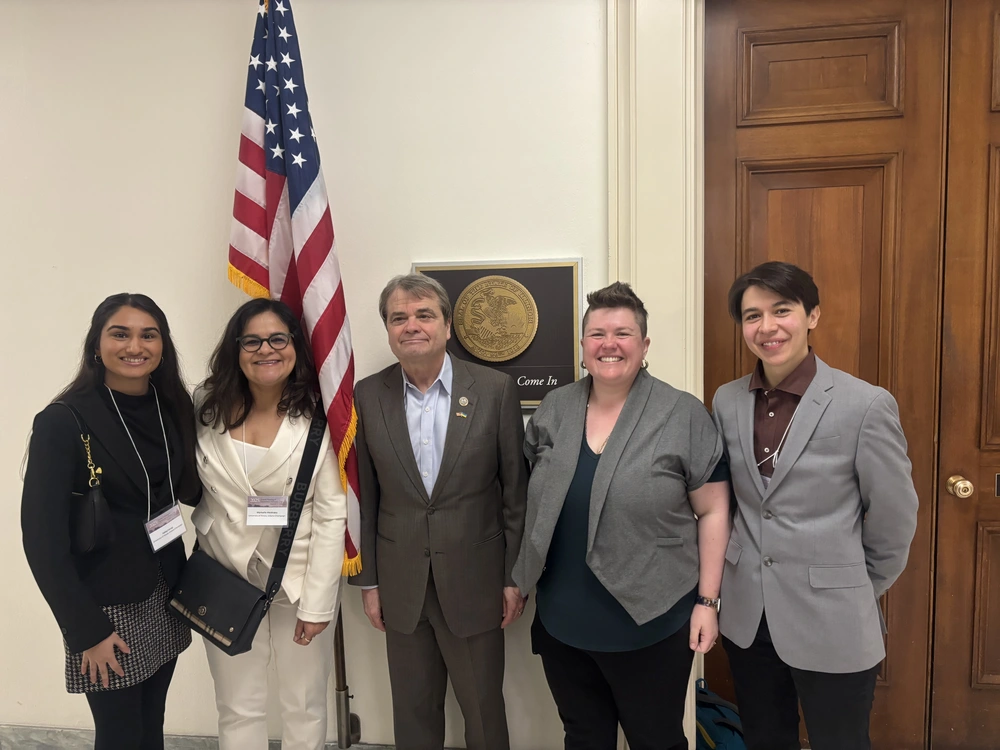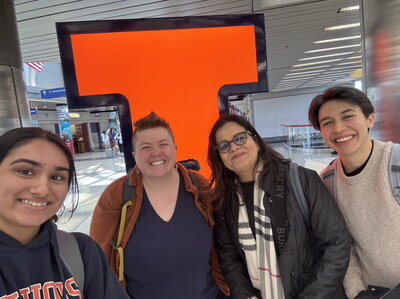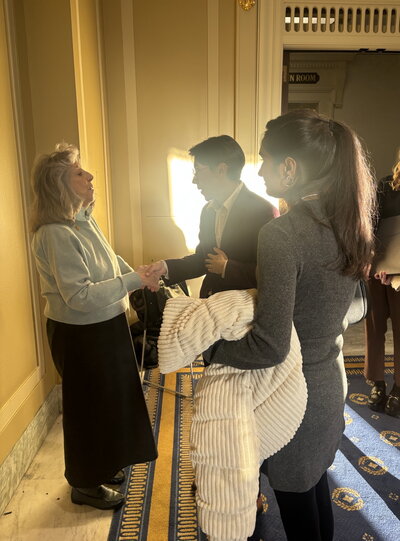
The humanities play a critical role in helping us better understand the world—and each other.
That was one of the key messages four SLCL students and faculty members shared with members of Congress as part of Humanities Advocacy Day in Washington, D.C. this spring.
On Humanities Advocacy Day, state-based delegations meet with members of Congress and their staff to make the case for federal funding for the humanities. Participants advocate for funding for several key agencies, including Title VI, Fulbright Hays, and the National Endowment for the Humanities.
“The work we do in the humanities is not only useful and important: it is absolutely essential,” said Lázaro García Angulo, a graduate student from the Department of Spanish & Portuguese who served as part of the University of Illinois delegation to D.C.
The trip was organized by the Humanities Research Institute (HRI), which funds humanities research at Illinois—through fellowships, internships, and programmatic support—and provides a forum for “tackling big questions and imagining bold, human-centered approaches to working for change.”

Along with García Angulo, the delegation included Mariselle Meléndez, director of SLCL; Clara Bosak-Schroeder, a professor in the Department of Classics; and Hafsa Faruqi, an undergraduate student majoring in Spanish and psychology.
“When I got the invite, I thought, ‘How could I say no?’ It felt really good to be asked to participate,” said Faruqi, who served as HRI's David F. Prindable undergraduate intern for 2023-24. “It was really nice that they thought of me, and it was cool to spend time with [the rest of the delegation] from the university.”
The group spent several days in D.C., also attending the National Humanities Alliance 2025 Annual Meeting that preceded the day visiting Capitol Hill.
“Some panels were meant to prepare us to advocate for specific agencies, programs, or institutions, [while others] were focused on developing strategies to ensure that the humanities keep thriving in higher education,” said García Angulo. “I found them incredibly inspiring. Something I also loved was working with my group to develop the best strategies to make our case for the humanities—in fifteen minutes or less—considering the specific interests and record of each of our representatives.”

During their visit to the Hill, the group met with staffers from the offices of U.S. Reps Mike Quigley and Nikki Budzinski and Sens. Dick Durbin and Tammy Duckworth.
“[Rep. Quigley] dropped by, so we got to meet him and take a photo, too,” said Faruqi. “He just came in to say, ‘We really appreciate the work that you’re doing,’ so I thought that was really nice.”
The words of encouragement went both ways.
“It was really gratifying to see [their] eyes light up when we told them about the impact of the humanities at Illinois and in the state at large,” said Bosak-Schroeder. “I could tell that we were giving them much-needed encouragement at this stressful time.”
While this year’s Humanities Day of Advocacy has come to an end, the work is nowhere near over. Members of this year’s delegation are shifting their focus to continuing to highlight the importance—and impact—of the humanities on campus.
“Now more than ever, we need to be strategic in the way we convey to administrators and political leaders that humanities as a discipline [plays] a key role in providing career skills that have proven to be crucial for workforce readiness,” said Meléndez. “Humanities graduates do find jobs, even in a competitive global market.”
As a current student in the humanities, Faruqi emphasized keeping an open mind and ignoring misconceptions.
“Something I heard during one of the panels we attended was, ‘The humanities will prepare you for your first job, but also your 10th,'” said Faruqi. “I would encourage students to [confidently] pursue a humanities degree, whether that’s alone or with another interest, like STEM or business or whatever you’re interested in. I think there’s this misconception of ‘if you go into the humanities or the arts, you won’t get a job,’ and that’s just not true. You can do a lot with a humanities degree.”
While some of the benefits of the humanities are easier to highlight—for example, the National Association of Colleges and Employers listing "global/multi-cultural fluency" as one of the top ten markers of career readiness among college graduates—others are less tangible.
“The humanities help us understand, connect, even see,” said García Angulo. “They make us better thinkers by allowing us to see past the surface of what surrounds us; they teach us to keep asking questions and to challenge easy narratives. (They are also important because they are fun, and joy is essential to life.)”
That sentiment is a common one among the rest of the delegation.
“The humanities are about understanding what it means to be human in a larger world,” said Bosak-Schroeder. “They are the site of history, beauty, and meaning. I can't imagine my life—or any purposeful life—without them.”